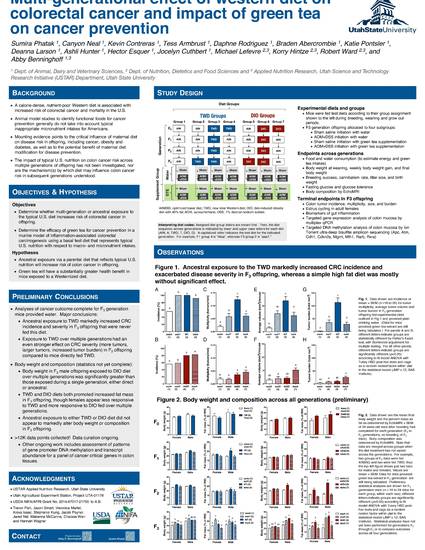
Diet is widely recognized as an important factor in lifetime cancer risk, yet Americans routinely consume foods that are energy-dense and nutrient-poor. Animal model studies to identify functional foods for cancer prevention generally do not account for typical Western dietary patterns with respect to macro- and micronutrient content. The primary objectives of this study were to determine the impact of ancestral and multi-generational consumption of a Western-style diet in a murine model of inflammation-associated colorectal carcinogenesis. Additionally, we sought to determine the efficacy of green tea for prevention of Western diet-enhanced colon tumorigenesis. Previously, our group developed the Total Western Diet (TWD) for rodents, which models the typical American diet with respect to macro- and micronutrient content on an energy density basis, as opposed to other simple high fat diets traditional used in pre-clinical studies. The hypotheses to be tested in this study were 1) that ancestral exposure to the TWD will increase risk of colon cancer in F3 generation offspring and 2) that green tea will have a substantially greater health benefit in mice exposed to a Westernized diet. Mice were bred for three generations, during which they were fed TWD or a simple high fat diet in the F0 only, F0 through F3 or the F3 generation only. The azoxymethane and dextran sodium sulfate model of inflammation-associated CRC was employed in the F3 generation. Other key measures included body weight gain, body composition (fat and lean mass) and glucose tolerance, preliminary data for which will be presented. To date, the animal study has been completed, and analyses of tumorigenesis, histopathology and other disease biomarkers are ongoing.
Available at: http://works.bepress.com/jocelyn-cuthbert/1/
